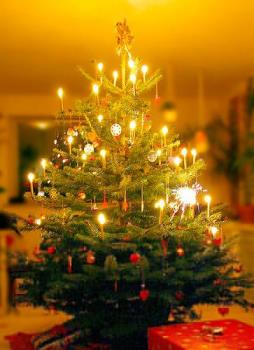Christmas..
By jeruel
@jeruel (141)
Philippines
December 7, 2006 10:55am CST
What is Christmas for you? Christmas is..(let's continue..)
let us start the answers rolling until we reach Christmas Day. By the Blessing of our Lord, we will receive blessings from HIM!!
1 response
@bapi_da (760)
• India
7 Dec 06
Christmas celebrations include a great number and variety of customs with either secular, religious, or national aspects which vary from country to country:In the southern hemisphere, Christmas is during the summer. This clashes with the traditional winter iconography, resulting in oddities such as a red fur-coated Santa Claus surfing in for a turkey barbecue on Australia's Bondi Beach. New Zealanders also commonly celebrate Christmas at the beach, coinciding with the vibrant red flowering of the coastal Pohutukawa or "New Zealand Christmas Tree".
Japan has adopted Santa Claus for its secular Christmas celebration, but New Year's Day is a far more important holiday. While in South Korea, Christmas is celebrated as an "official" holiday, and in India it is often called bada din ("the big day"). Celebrations revolve around Santa Claus and shopping.
In Poland, Santa Claus (Polish: Swiety Mikolaj) gives gifts on two occasions: on the night of December 5 (so that children find them on the morning of December 6), and on Christmas Eve (so that children find gifts that same day). In addition to the major observances of Christmas, German children also put shoes out at their doors on the night of December 5, and find them filled with candy and small gifts the next morning. Santa Claus (Hungarian: Mikulás), or Father Winter (Hungarian: Télapó) also visits Hungary on December 6, bringing small gifts, and is often accompanied by a black creature called Krampusz; while on Christmas Eve (Holy Night - (Hungarian: Szenteste)) the Little (Baby) Jesus (Hungarian: Kisjézus or Jézuska) delivers the presents.
In Spain, gifts are brought by the Magi on Epiphany (January 6), and in Scotland, presents were traditionally given on Hogmanay, which is New Year's Eve. In recent times, both countries have also adopted gift-giving on Christmas Eve/Christmas Day.
The Declaration of Christmas Peace has been a tradition in Finland from the Middle Ages every year, except in 1939 (due to World War II). The declaration takes place in the Old Great Square of Turku, Finland's official Christmas City and former capital. It is broadcast on Finnish radio and television. Sauna bathing has an important role in Finnish Christmas, often after the visit of Joulupukki on Christmas Eve.
Saint Nicholas' Day remains the principal day for gift giving in the Netherlands while Christmas Day is a more religious holiday.
In Russia, Grandfather Frost brings presents on New Year's Eve, and these are opened on the same night. However, after the Russian Revolution, Christmas celebration was banned in that country from 1917 until 1992. Even today, throughout the U.S. and Europe, several Christian denominations, notably the Jehovah's Witnesses, Puritans, and some fundamentalists, view Christmas as a pagan holiday not sanctioned by the Bible.In many countries, businesses, schools, and communities have Christmas parties and dances in the weeks before Christmas. Christmas pageants may include a retelling of the story of the birth of Christ. Groups may visit neighborhood homes to sing carols. Others do volunteer work or hold fundraising drives for charities.
On Christmas Day or Christmas Eve, a special meal is usually served. In some regions, particularly in Eastern Europe, these family feasts are preceded by a period of fasting. Candy and treats are also part of Christmas celebration in many countries.
Another tradition is for people to send cards to their friends and family members. The traditional greeting phrase on these cards is "Merry Christmas". Cards are also produced with messages such as "Season's Greetings" or "Happy Holidays", so as to include senders and recipients who may not celebrate Christmas .






